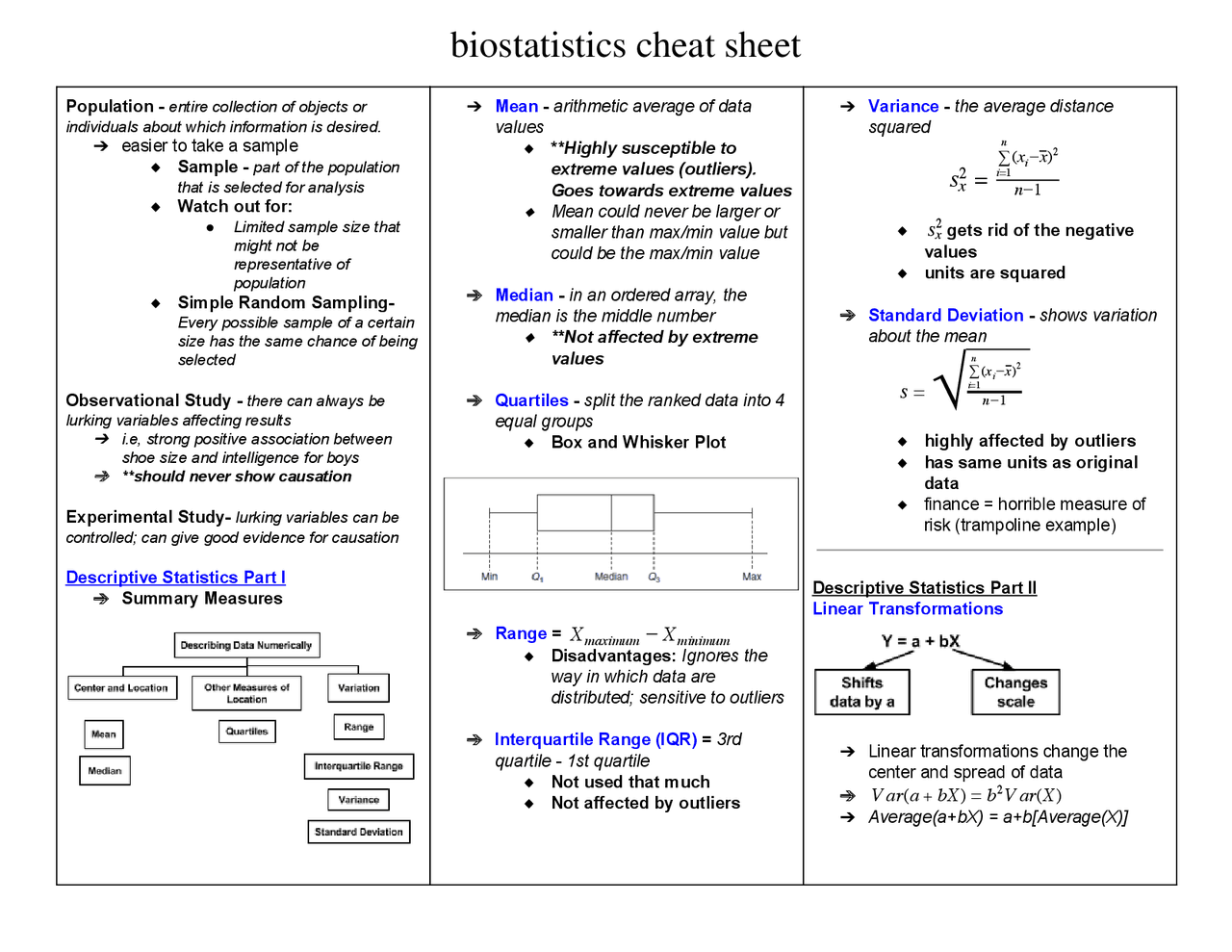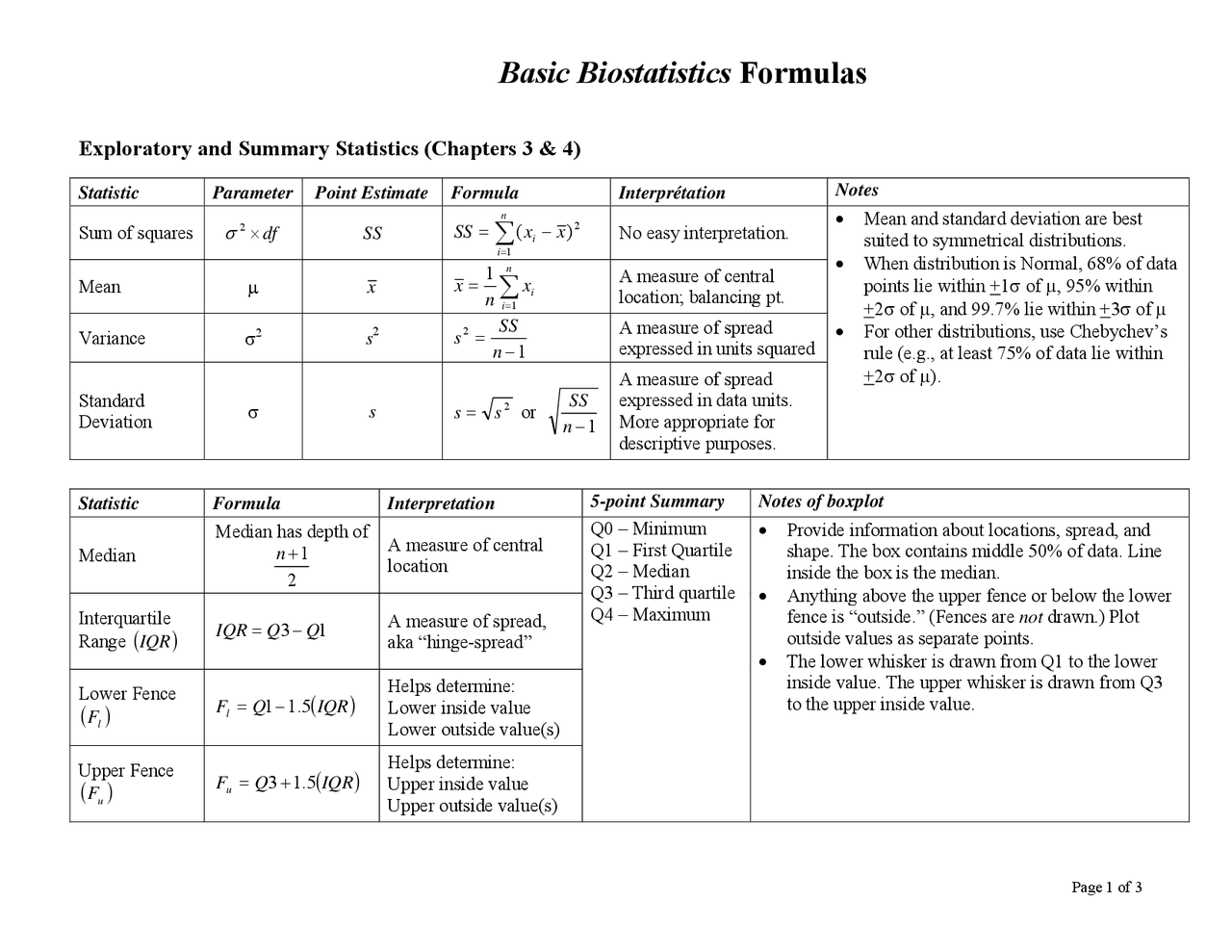Biostatistics Cheat Sheet - Describe differences between descriptive and inferential statistics. Data ranked in a specific order that includes a constant difference in magnitude of change. Tests for a relationship between two categorical variables (makes the assumption that each cell has at least 5 when you split by table!) Biostatistics is more than a compilation of computational techniques! Identify different types of data (nominal, ordinal, continuous [ratio and. Identify the main types of measurement scales:
Tests for a relationship between two categorical variables (makes the assumption that each cell has at least 5 when you split by table!) Identify the main types of measurement scales: Describe differences between descriptive and inferential statistics. Biostatistics is more than a compilation of computational techniques! Data ranked in a specific order that includes a constant difference in magnitude of change. Identify different types of data (nominal, ordinal, continuous [ratio and.
Data ranked in a specific order that includes a constant difference in magnitude of change. Describe differences between descriptive and inferential statistics. Biostatistics is more than a compilation of computational techniques! Identify the main types of measurement scales: Identify different types of data (nominal, ordinal, continuous [ratio and. Tests for a relationship between two categorical variables (makes the assumption that each cell has at least 5 when you split by table!)
SOLUTION Biostatistics cheat sheet Studypool
Identify the main types of measurement scales: Describe differences between descriptive and inferential statistics. Biostatistics is more than a compilation of computational techniques! Data ranked in a specific order that includes a constant difference in magnitude of change. Identify different types of data (nominal, ordinal, continuous [ratio and.
HLSC 2P07 Cheat Sheet Summary Biostatistics I Biostatistics
Identify different types of data (nominal, ordinal, continuous [ratio and. Describe differences between descriptive and inferential statistics. Tests for a relationship between two categorical variables (makes the assumption that each cell has at least 5 when you split by table!) Identify the main types of measurement scales: Data ranked in a specific order that includes a constant difference in magnitude.
Biostats Cheat Sheet ticCheat Sheet Chapter Binomial Law Chapter
Biostatistics is more than a compilation of computational techniques! Describe differences between descriptive and inferential statistics. Identify different types of data (nominal, ordinal, continuous [ratio and. Data ranked in a specific order that includes a constant difference in magnitude of change. Identify the main types of measurement scales:
Biostatistics Cheat Sheet PDF
Describe differences between descriptive and inferential statistics. Tests for a relationship between two categorical variables (makes the assumption that each cell has at least 5 when you split by table!) Identify the main types of measurement scales: Data ranked in a specific order that includes a constant difference in magnitude of change. Biostatistics is more than a compilation of computational.
Biostatistics cheat sheet Docsity
Identify the main types of measurement scales: Biostatistics is more than a compilation of computational techniques! Describe differences between descriptive and inferential statistics. Tests for a relationship between two categorical variables (makes the assumption that each cell has at least 5 when you split by table!) Data ranked in a specific order that includes a constant difference in magnitude of.
Step 3 Biostats Cheat Sheet Cheat Sheet vrogue.co
Identify the main types of measurement scales: Describe differences between descriptive and inferential statistics. Biostatistics is more than a compilation of computational techniques! Identify different types of data (nominal, ordinal, continuous [ratio and. Tests for a relationship between two categorical variables (makes the assumption that each cell has at least 5 when you split by table!)
Basic Biostatistics Formulas Cheat Sheet Docsity
Tests for a relationship between two categorical variables (makes the assumption that each cell has at least 5 when you split by table!) Data ranked in a specific order that includes a constant difference in magnitude of change. Identify the main types of measurement scales: Biostatistics is more than a compilation of computational techniques! Describe differences between descriptive and inferential.
Step 3 Biostats Cheat Sheet Cheat Sheet vrogue.co
Describe differences between descriptive and inferential statistics. Data ranked in a specific order that includes a constant difference in magnitude of change. Identify different types of data (nominal, ordinal, continuous [ratio and. Identify the main types of measurement scales: Biostatistics is more than a compilation of computational techniques!
Step 3 biostats cheat sheet cheat sheet vrogue.co
Data ranked in a specific order that includes a constant difference in magnitude of change. Biostatistics is more than a compilation of computational techniques! Identify the main types of measurement scales: Tests for a relationship between two categorical variables (makes the assumption that each cell has at least 5 when you split by table!) Identify different types of data (nominal,.
Formulas Summary Fundamentals Of Biostatistics Formulas Name
Tests for a relationship between two categorical variables (makes the assumption that each cell has at least 5 when you split by table!) Data ranked in a specific order that includes a constant difference in magnitude of change. Identify the main types of measurement scales: Describe differences between descriptive and inferential statistics. Identify different types of data (nominal, ordinal, continuous.
Data Ranked In A Specific Order That Includes A Constant Difference In Magnitude Of Change.
Tests for a relationship between two categorical variables (makes the assumption that each cell has at least 5 when you split by table!) Identify the main types of measurement scales: Identify different types of data (nominal, ordinal, continuous [ratio and. Describe differences between descriptive and inferential statistics.









